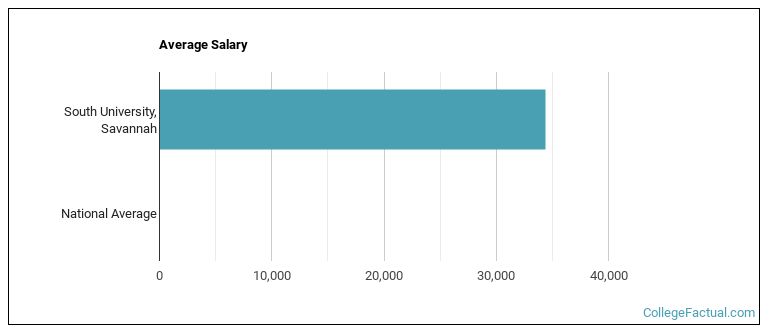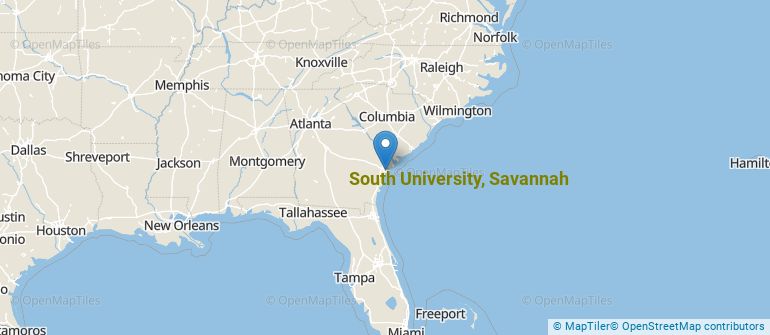 by our College Data Analytics Team
by our College Data Analytics TeamCollege Factual analyzes over 2,000 colleges and universities in its annual rankings and ranks them in a variety of ways, including most diverse, best overall quality, best for non-traditional students, and much more.
South University, Savannah was awarded 11 badges in the 2025 rankings. The highest ranked major at the school is health professions.
Explore the best ranked schools for the programs you are most interested in.
South University, Savannah was not ranked in College Factual's Best Overall Colleges report this year. This may be because not enough data was available.
South University, Savannah has an open admissions policy, so you should not have much trouble being accepted by the school. Still, it is important to fill out the application completely and submit any requested materials, which may include proof that you have a high school diploma or the equivalent.
At South University, Savannah, the student to faculty ratio is an excellent 12 to 1. That's much better than the national average of 15 to 1. This indicates that many classes will probably be small, and students will have ample opportunites to work closely with their professors and classmates.
Another measure that is often used to estimate how much access students will have to their professors is how many faculty members are full-time. The idea here is that part-time faculty tend to spend less time on campus, so they may not be as available to students as full-timers.
The full-time faculty percentage at South University, Savannah is 59%. This is higher than the national average of 47%.
The freshmen retention rate is a sign of how many full-time students like a college or university well enough to come back for their sophomore year. At South University, Savannah this rate is 50%, which is a bit lower than the national average of 68%.
When we say that a student has graduated on time, we mean that they have finished their bachelor's degree within four years. The on-time graduation rate at South University, Savannah is 17%. That's lower than the national rate of 33.3%
Find out more about the retention and graduation rates at South University, Savannah.
During the 2017-2018 academic year, there were 246 undergraduates at South University, Savannah with 187 being full-time and 59 being part-time.
| $0-30 K | $30K-48K | $48-75 | $75-110K | $110K + |
|---|---|---|---|---|
| $19,222 | $20,940 | $23,819 | $28,143 | $26,119 |
The net price is calculated by adding tuition, room, board and other costs and subtracting financial aid.Note that the net price is typically less than the published for a school. For more information on the sticker price of South University, Savannah, see our tuition and fees and room and board pages.
It's not uncommon for college students to take out loans to pay for school. In fact, almost 66% of students nationwide depend at least partially on loans. At South University, Savannah, approximately 75% of students took out student loans averaging $6,630 a year. That adds up to $26,520 over four years for those students.
Get more details about paying for South University, Savannah.

See which majors at South University, Savannah make the most money.
Get more details about the location of South University, Savannah.

Contact details for South University, Savannah are given below.
| Contact Details | |
|---|---|
| Address: | 709 Mall Blvd, Savannah, GA 31406 |
| Phone: | 912-201-8000 |
| Website: | www.southuniversity.edu/savannah#location=Savannah, GA |
| Most Popular Majors | Bachelor’s Degrees | Average Salary of Graduates |
|---|---|---|
| Allied Health Professions | 69 | NA |
| Nursing | 44 | $77,635 |
| Pharmacy/Pharmaceutical Sciences | 42 | NA |
| Allied Health & Medical Assisting Services | 39 | NA |
| Business Administration & Management | 23 | $43,773 |
| Mental & Social Health Services | 16 | NA |
| Health & Medical Administrative Services | 15 | $39,722 |
| Public Health | 10 | $34,789 |
| General Psychology | 10 | $28,684 |
| Criminal Justice & Corrections | 8 | $37,713 |
Online learning is becoming popular at even the oldest colleges and universities in the United States. Not only are online classes great for returning adults with busy schedules, they are also frequented by a growing number of traditional students.
In 2022-2023, 248 students took at least one online class at South University, Savannah. This is an increase from the 192 students who took online classes the previous year.
| Year | Took at Least One Online Class | Took All Classes Online |
|---|---|---|
| 2022-2023 | 248 | 212 |
| 2021-2022 | 192 | 134 |
| 2020-2021 | 193 | 119 |
| 2018-2019 | 297 | 0 |
Learn more about online learning at South University, Savannah.
Footnotes
*The racial-ethnic minorities count is calculated by taking the total number of students and subtracting white students, international students, and students whose race/ethnicity was unknown. This number is then divided by the total number of students at the school to obtain the racial-ethnic minorities percentage.
References
More about our data sources and methodologies.